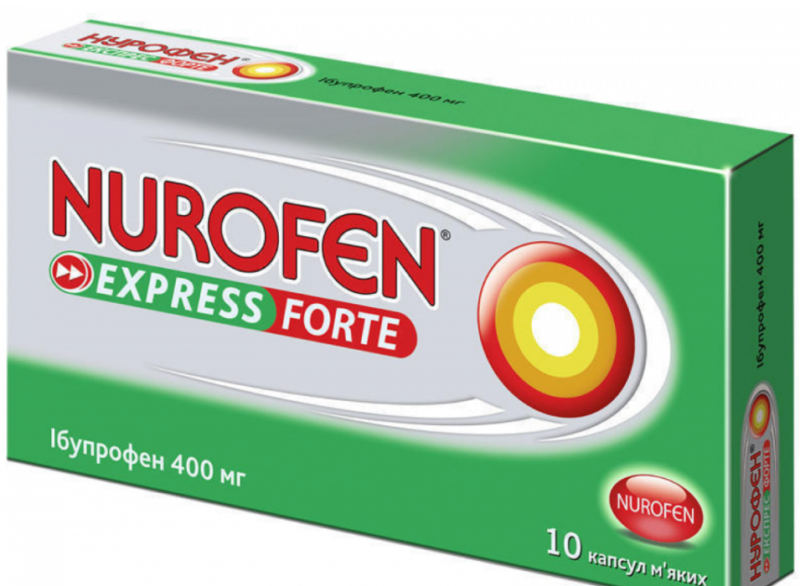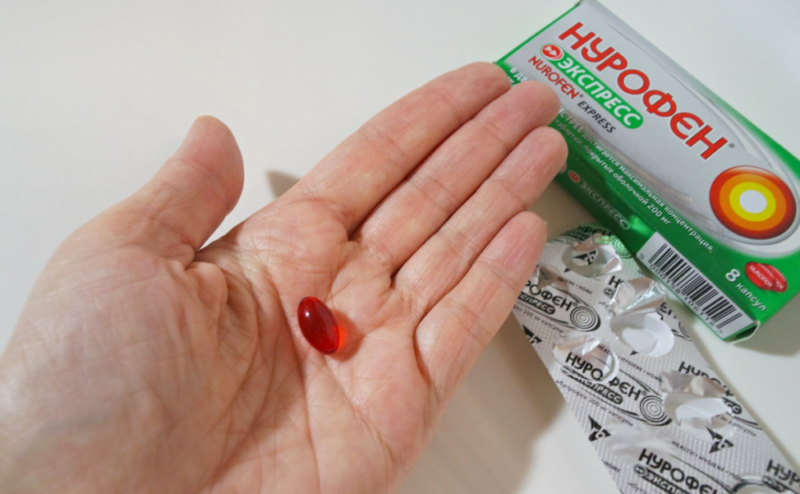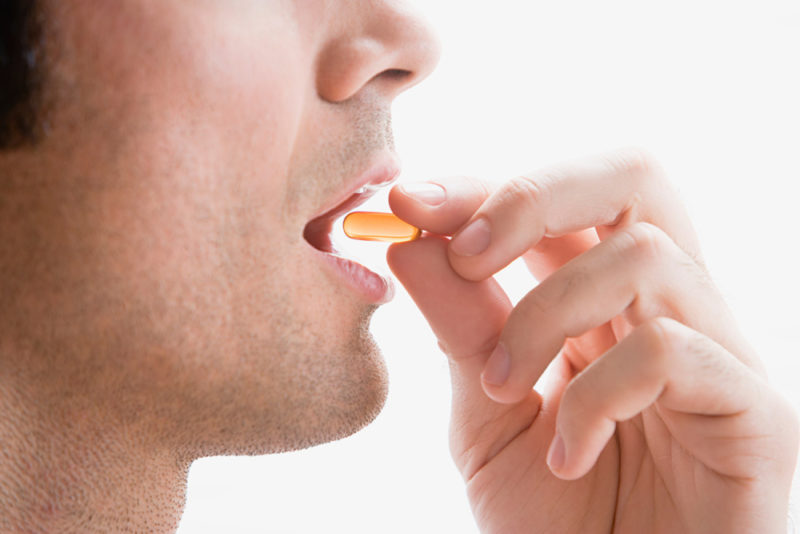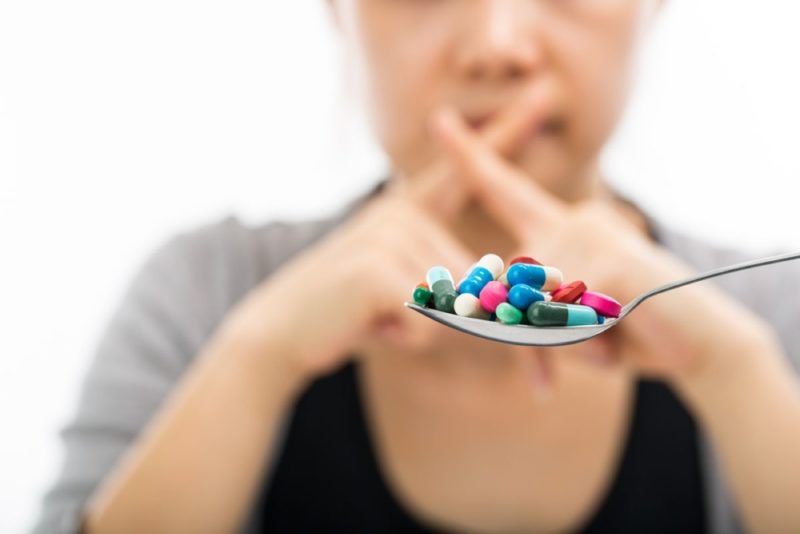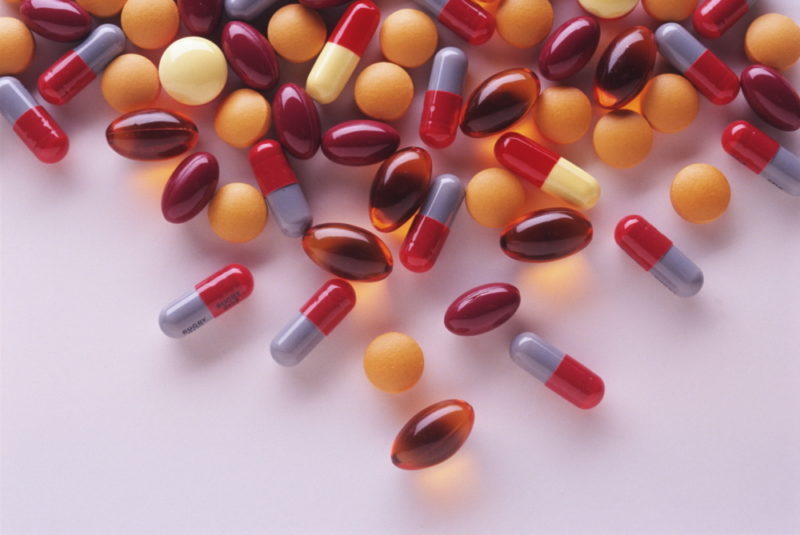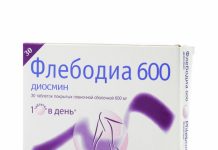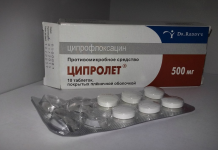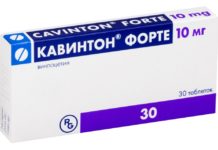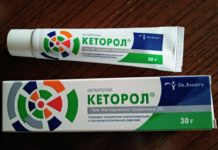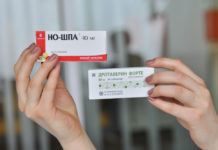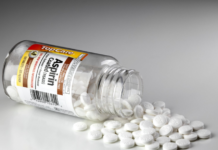Nurofen Express Forte - an anesthetic that eliminates the course of inflammatory processes, lowers the temperature. The main substance is ibuprofen. It is like a barrier preventing the manifestation of certain reactions in the body that occur during the development of various diseases. Delays the production of substances that cause inflammation and pain.
Material Content:
- 1 The composition of the drug
- 2 Pharmacological action and pharmacokinetics
- 3 What helps Nurofen Express Forte
- 4 Instructions for use and dosage for children and adults
- 5 During pregnancy and breastfeeding
- 6 Drug interaction
- 7 Alcohol compatibility
- 8 Contraindications, side effects and overdose
- 9 Analogs of NSAIDs
The composition of the drug
Available in translucent capsules of oval gelatin, painted in red. On each of them the word "NUROFEN" is written in white letters. Inside is a colorless or light pink liquid that is always transparent.
The capsule contains 400 mg of ibuprofen. As additional components used:
- water;
- potassium hydroxide;
- macrogol 600.
Shell components:
- gelatin;
- water;
- partially dehydrogenated sorbitol;
- crimson dye;
- white ink Opacode WB NS-78-I801.
Pharmacological action and pharmacokinetics
Ibuprofen is a derivative of propionic acid. Included in the NSAIDs group. The substance inhibits the production of mediators of hyperthermic reactions, pain, inflammation - prostaglandins. It inhibits the action of cyclooxygenase groups 1 and 2 (COX-1, COX-2), which stops the formation of prostaglandins.
Ibuprofen has an analgesic, anti-inflammatory effect and reduces temperature.At the same time, it makes the blood more fluid, stops the process of gluing platelets.
After taking Nurofen Express Forte, 400 mg capsules are rapidly and almost completely absorbed by the walls of the gastrointestinal tract. After drinking 2 capsules of the medicine on an empty stomach, the main substance, after a quarter of an hour, is detected in the blood, and after half an hour the highest concentration is reached. This period increases if you drink the medicine with food.
About 90% of the main substance binds to blood proteins. The elimination half-life is two hours. Accumulates in the synovial fluid.
Almost 60% of the R-form, which is inactive, turns into the active S-form after absorption. Metabolized by liver cells. Only 1% of the substance remains unchanged. The main part is excreted by the urinary system and a little by the liver.
No significant differences were found in patients of different ages.
What helps Nurofen Express Forte
Nurofen Express Forte helps with the following conditions:
- fever caused by the common cold or flu;
- neuralgia;
- headache, migraine;
- rheumatic pains;
- muscle soreness;
- Toothache
- soreness in the back;
- menstrual cramps.
Instructions for use and dosage for children and adults
Short-term use is allowed even for children from the age of 12, whose weight exceeds 40 kg. Capsules should be drunk together or after eating. They can not be chewed. Drink plenty of water.
You can take 1 capsule at a time. If necessary - take every 6 hours for 1 pc. The maximum daily dose is 3 pcs. or 1200 mg of ibuprofen for adults and 1000 mg for children. In this mode, you can take the medicine, but not for long.
For elderly patients, it is not necessary to select a dosage only if they do not have hepatic or renal dysfunction in the past.
When the signs of the pathology remain unchanged for more than 3 days or intensify, you need to see a doctor so that he clarifies the diagnosis and adjusts the treatment regimen. The duration of the course is determined by a specialist taking into account the individual indicators of the patient, the course of pathology.
Nurofen Express Forte for children under 12 years old and weighing less than 40 kg, this medicine is not prescribed.
During pregnancy and breastfeeding
At the final stage of pregnancy, using this medication is prohibited. In the I and II trimesters, you need to try to avoid taking it, otherwise a mandatory consultation with a gynecologist is required.
Ibuprofen in small doses when breastfeeding passes into milk. Short-term use of the drug does not harm the baby. For this reason, there is no need to refuse breastfeeding. If you need a long reception, you should get the doctor’s recommendations to solve the issue of stopping lactation while using the medication.
Drug interaction
You need to take Nurofen Express Forte carefully in combination with other medicines, because there is a possibility of their interaction.
Use with other drugs:
- glucocorticosteroids leads to ulcers and the development of bleeding in the digestive tract;
- anticoagulants such as warfarin and thrombolytic drugs increase the effectiveness;
- lithium and methotrexate - the content in the blood increases;
- mifepristone - there is a decrease in performance. Ibuprofen can be used only 1-2 weeks after the end of treatment with mifepristone;
- cardiac glycosides - an increase in their concentration in plasma is observed, the insufficiency of the heart is aggravated, the functionality of the kidneys decreases;
- with antibiotics belonging to the quinolone series - causes involuntary muscle contraction;
- antiplatelet agents and antidepressants of the third generation - bleeding in the digestive tract may occur;
- cyclosporine and tacrolimus - the possibility of manifestation of nephrotoxicity increases;
- zidovudine - there is an increase in hematotoxicity.There is a high probability of bruising and hemarthrosis in patients with HIV and hemophilia associated with this disease;
- diuretics, antihypertensive drugs, inhibiting ACE and ARA II - there is a decrease in their effectiveness. Against the background of the use of diuretics, the nephrotoxicity of ibuprofen may increase.
The tool can provoke the manifestation of an undesirable reaction when used together with such substances:
- other NSAIDs, and more precisely, with selective COX-2 inhibitors;
- acetylsalicylic acid. Taking aspirin in small doses as an antiplatelet agent, there is a decrease in its anti-inflammatory and antiplatelet effects, which increases the likelihood of acute heart failure.
Alcohol compatibility
Instructions for use Nurofen Express Forte does not recommend combining its intake with drinks containing alcohol. Many do not understand why this cannot be done, they calmly drink alcohol-containing drinks immediately after the pain is relieved. It is very dangerous!
Alcohol has an effect on the rate of drug breakdown in the liver tissue. Increasing the speed of metabolic processes leads to the rapid removal of the drug from the patient's body and the resumption of pain. In this case, it becomes necessary to take the medication again, which can lead to an overdose of the drug and harm the hepatocytes - the cells of the liver tissue.
And also, the medicine can cause internal bleeding, the appearance of ulcers on the mucous surfaces of the digestive tract, allergies, and dysfunctions of the nervous system.
Contraindications, side effects and overdose
The use of ibuprofen is not advisable if the patient:
- allergy to the active substance and constituent drugs;
- bronchial asthma, which is combined with recurrent polyposis of the sinuses and an allergy to NSAIDs;
- erosion and ulcers of the digestive system;
- the presence in the history of ulcerative perforation caused by non-steroidal anti-inflammatory drugs;
- severe liver pathology;
- confirmed hyperkalemia, severe renal dysfunction, with clearance less than 30 ml per minute;
- decompensated heart failure;
- recovery after coronary artery bypass surgery;
- bleeding of various etiologies;
- fructose allergy;
- hemophilia or pathology leading to hypocoagulation, hemorrhagic diathesis;
- pregnancy in the third trimester;
- under 12 years old.
The appearance of side signs is associated with the wrong dosage. Therefore, the drug should be taken in a small effective amount in a short course.
Immune system: non-specific allergy, anaphylactic shock, eosinophilia, bronchial asthma, hay fever, changes in frequency, rhythm and depth of breath, bronchospasm, Quincke's edema, purpura, urticaria, dermatoses such as Lyell or Stevens-Johnson syndrome, erythema polymorphic .
Blood and lymphatic system: leukopenia, various types of anemia, a sharp decrease in the number of platelets, white blood cells, monocytes, red blood cells. Indicators of impaired function are the appearance of soreness in the throat, fever, mouth ulcers, signs of flu, general malaise, difficult to stop nosebleeds and subcutaneous hemorrhages.
Gastrointestinal organs: abdominal pain, bloating, flatulence, diarrhea, heartburn, nausea with vomiting, constipation, damage to the gastrointestinal mucosa by peptides and hydrochloric acid, associated bleeding, blood impurities in the vomit, melena, sometimes fatal, inflammation of the gastric mucosa, bleeding stomatitis, exacerbation of Crohn's disease and inflammation of the colon.
Liver and biliary tract: organ dysfunction, jaundice, hepatitis.
Urinary system: acute renal dysfunction, hematuria, massive proteinuria, generalized edema, hyperlipidemia, hypoalbuminemia, hypoproteinemia, necrotic papillitis, inflammation of the interstitial tissues, as well as the bladder.
Nervous system: systemic lupus erythematosus, headache, inflammation of the lining of the brain, pathology of connective tissues.
Heart and blood vessels: edema, decompensated dysfunction of the heart muscle, heart attack, high blood pressure, stroke.
Respiratory organs: shortness of breath, bronchospasm, bronchial asthma.
Changes in blood counts: a decrease in hematocrit and sugar, hemoglobin, low coagulability, creatinine clearance, increased activity of liver enzymes.
If these symptoms appear, you need to urgently seek medical help.
An overdose is manifested by abdominal pain, nausea, accompanied by vomiting, loose stools, bleeding in the stomach or intestines, tinnitus, migraines.
In severe cases, excitement, involuntary muscle contractions, loss of orientation, drowsiness appear, the patient falls into a coma.
Severe intoxication contributes to a violation of the acid-base composition of the blood, a decrease in coagulability, acute renal failure, destruction of the liver, hypotension, respiratory failure, the appearance of signs indicating cyanosis, and an increase in asthma attacks.
Treatment is carried out according to the symptoms. Provides unhindered breathing, monitoring of the heart and vital signs.
Within an hour, it is necessary to wash the stomach, give the patient any sorbent.
If time is lost, an alkaline drink is prescribed to deactivate the acid component of ibuprofen and evacuate it with the kidneys, as well as an abundant intake of fluids.
Attacks of convulsions are eliminated with lorazepam or diazepam, administered intravenously.
An exacerbation of asthma is removed by bronchodilators.
Analogs of NSAIDs
The drug has many analogues of different price categories with ibuprofen as the main active substance:
- Ibuprofen.
- It’s long.
- Nurofen
- MIG 400.
- Ibuklin.
- Brustan.
- Burana.
Nurofen Express Forte is an effective analgesic and antipyretic. It can not be taken uncontrollably, which can lead to the appearance of undesirable complications, even death. Therefore, the dosage and duration of therapy should be prescribed exclusively by a specialist. Remember - self-medication is dangerous!


